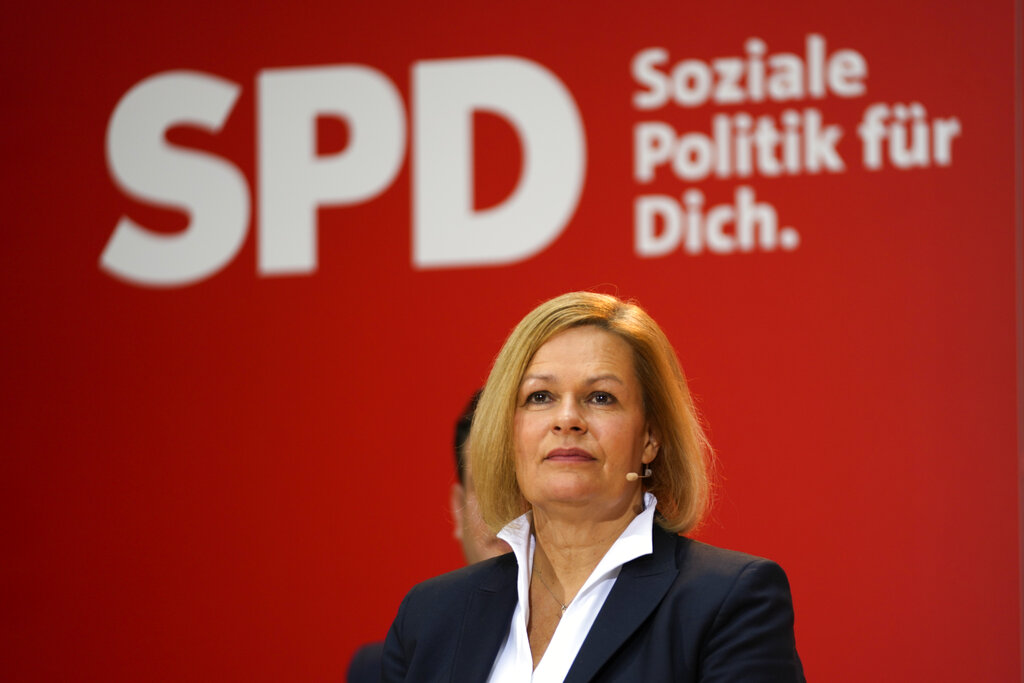German Interior Minister-designate Nancy Faeser of the left-wing Social Democrats (SPD) has announced that she will focus the ministry’s work on combating right-wing extremism, which she labeled as the country’s top threat despite the prevalence of migrant crime and the threat of Islamic terrorism.
“The people in our republic rightly demand that we ensure internal security,” said the current chairman of the Hessian SPD parliamentary group. “It will be of particular concern to me to combat the greatest threat that our free democratic basic order currently faces: right-wing extremism.”
For this, the 51-year-old lawyer said on Monday she will rely on the country’s well-trained law enforcement officials, especially in the federal police. Faeser delivered her remarks at a presentation of SPD ministerial candidates in the new traffic light coalition, which are to be sworn in today.
With Faeser, for the first time in the history of the Federal Republic of Germany, a woman is to occupy the post of Federal Minister of the Interior. She has been a member of the SPD since 1988 and after her studies first worked at the Johann Wolfgang Goethe University in Frankfurt am Main, then as a lawyer in a commercial law firm.
In the past few months, Faeser had campaigned for more pressure on unvaccinated people to fight the corona pandemic, including calling for more 2G regulations and the right of employers to review the vaccination status of employees. In the state parliament, she also voted for a deportation freeze on migrants back to Afghanistan.
She also rejected an application by the Alternative for Germany to classify the former communist German Democratic Republic as an “unjust state.”
AfD criticizes direction of interior minister
While the designated Chancellor Olaf Scholz (SPD) praised Faeser as an experienced politician, criticism from the AfD is amplifying.
“What she considered important in her few words was the kowtowing in front of the party line, which consists in supporting the narrative of the outstanding security-political significance of right-wing extremism. Regardless of the fact that every right-wing extremist act of violence is criminal, repugnant and, if at all possible, preventable, such narrowing of the focus testifies to a terrifying blindness to the structural problems of Islamist and foreigner crime, as well as to extremist acts of violence from the left,” said the domestic political spokesman for the AfD parliamentary group, Gottfried Curio.
As previously reported by Remix News, the threat of Islamist violence is a constant one in Germany, and if open terrorism investigations and terrorism-related trials are a measure of the threat facing a nation, then Islamic terrorism is statistically speaking, a far greater threat:
“According to Le Parisien, German police have also foiled a dozen planned vehicle attacks since December 2016, such as the one seen at Breitscheidtplatz Christmas market in 2016 that killed 12 people.
According to French newspaper, since 2013, the number of Islamists in Germany considered dangerous has seen a fivefold increase and currently stands at 680. The number of Salafists has also doubled since 2013 and is estimated at around 11,000.
The German Federal Public Prosecutor (GBA) announced that for 2019 that 400 of the total of 663 terrorist proceedings were related to Islamic terrorism, representing 60.3 percent of all cases, a finding that was also reflected in previous years. The GBA data also shows that Syrians, Afghans and Iraqis make up a significant number of these terrorist suspects.
In the first half of 2020, 151 cases have been pursued against Islamist terrorist suspects in Germany.
The AfD is pointing out that Faeser may be more concerned with ideology than actually defending Germans.
“Anyone who immediately offers distortion of facts as a business card and turns a blind eye to the crime statistics, which speak a clear language, does not seem to have the security of German citizens as their top priority,” added Curio.
The AfD already remains under constant observation in certain German states, which means that one of the largest opposition parties in the country is constantly surveilled by German intelligence services. Members of the party who have been accused of no wrongdoing have their emails, phone calls, and other activities monitored. Under Faeser, the political repression AfD has experienced could now grow even more extreme. A ruling on whether the entire party can be placed under surveillance is expected sometime in the near future.






